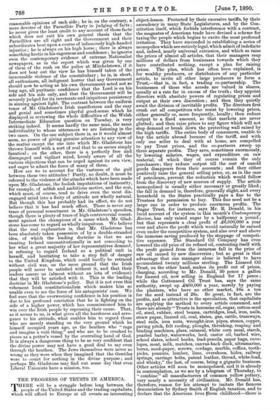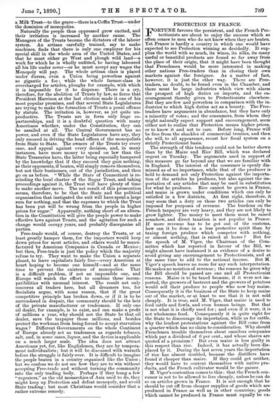two cases. On the one subject there is, as it
would almost the high tariffs. The entire body of consumers, unable to seem, no power of giving genuine attention to any view of buy the article abroad because of the tariff, and with -the matter except the one into which Mr. Gladstone has only one seller to deal -with at home, are compelled -thrown himself with a sort of zeal that to us seems simply to pay Trust prices, and the co-partners sweep up fanatical ; on the other, there is a perfectly free and three separate profits. They save, sometimes enormously, -disengaged and vigilant mind, keenly aware of all the by lowering salaries, wages, and expenditure on raw various objections that can be urged against its own view, material, of which they of course remain the only and eager to admit the force of many of them. purchasers ; they reduce output till the cost of unsold How are we to account for the vastness of the gulf goods disappears from their accounts ; and they either between these two attitudes ? Partly, no doubt, it must be positively raise the general selling price, or, as in the case referred to the violence of the attacks which have been made of petroleum, prevent the reduction which would follow -upon Mr. Gladstone, the foolish imputations of insincerity, from the discovery of new sources of supply. The article for example, of selfish and ambitious motive, and the rest, monopolised is usually either necessary or greatly liked; which must, of course, tend to drive even the most dis- the fall in demand is, therefore, generally slight, and every -engaged mind into a. fixity of attitude not wholly natural. household in the States practically pays a fine to the But though this has probably had its effect, we do not Trustees for permission to buy. This fine need not be a believe that it has had much effect. There is never any large one in order to produce enormous profits. The trace of ipersonal resentment in Mr. Gladstone's speeches, Sugar Trust, for instance, says Mr. R. Donald, in his though there is plenty of trace of high controversial resent- lucid account of the system in this month's Contemporary ment against the champions of a cause which Mr. Glad- Beview, has only raised sugar by a halfpenny a pound ; stone has come to regard as wholly iniquitous. We believe but that represents a clear profit of £6,000,000 a year that the real explanation is, that Mr. Gladstone has over and above the profit which would naturally be earned been absolutely taken possession of by a double-stranded even under the competitive system, and also over and above idea, of which the leading doctrine is that we are the immense saving produced by the stoppage of competi- treating Ireland unconstitutionally in not conceding to tive expenses. The Standard Oil Company has even her what a great majority of her representatives demand, lowered the old price of its refined oil, contenting itself with in refusing to regard Ireland as a political unit in the profit gained from the immense fall in the price of herself, and hesitating to take a step full of danger raw oil caused by new discoveries ; but so great is that to the -United Kingdom, which could hardly be retraced advantage that one manager alone is believed to have without civil war, on the mere ground that the Irish accumulated twenty millions sterling. The Linseed Oil people will never be satisfied without it, and that their Trust, on the other hand, makes its profit out of prices, leaders assure us (almost without an iota of evidence) charging, according to Mr. Donald, 30 pence a gallon that they will be satisfied with it. This is the leading for linseed oil, now selling in England for 17 pence ; doctrine in Mr. Gladstone's policy. But it is not even this while the Cottonseed Oil Trust has, says the same -vehement Irish constitutionalism which makes him so authority, swept up £400,000 a year, merely by paying unable even to see the force of his antagonists' case. We the planters, who have no other market, 16s. a ton feel sure that the overweening confidence in his position is for the seed instead of 28s. So great, in fact, are the -due to his profound conviction that he is fighting on the profits, and so attractive is the speculation, that capitalists side of a higher power, which has commissioned him to are applying the method to every article consumed, and win over the Irish people by espousing their cause. That, there are already " Trusts in kerosene oil, sugar, cotton-seed as it seems to us, is what gives all the harshness and arro- oil, steel, rubber, steel beams, cartridges, lead, iron, nails, gance to his attitude, what enables him to regard those straw paper, linseed oil, coal, slates, gas, cattle, tramways, who are merely standing on the very ground which he steel rails, iron nuts, wrought-iron pipes, stones, copper, himself occupied years ago, as the heathen who "rage paving pitch, felt roofing, ploughs, threshing, reaping and and imagine a vain thing," and who are to be crushed to binding machines, glass, oatmeal, white corn meal, starch, pieces as a potter's vessel by the overruling hand of God. pearled barley, waterworks, lard, castor oil, barbed wire, It is always a dangerous thing to be so very confident that school slates, school books, lead-pencils, paper bags, enve- the divine power may not have a good deal to say even lopes, meat, milk, matches, canvas-back duck, ultramarine, through the heathen. The Jews themselves were never so borax, sand-paper, screws, cordage, marble, coffins, tooth- wrong as they were when they imagined that the Gentiles picks, peanuts, lumber, lime, overshoes, hides, railway were to count for nothing in the divine purpose ; and springs, carriage bolts, patent leather, thread, white-lead, perhaps Mr. Gladstone may find out some day that even and whisky," the last, of course, being a gigantic business.
in contemplation, as we see by a telegram of Thursday, to "combine" all manufacturers of common yellow pottery, THE PROGRESS OF TRUSTS IN AMERICA. very nearly a necessity of civilisation. Mr. Donald has, a Milk Trust—to the grave—there is a Coffin Trust—under the dominion of monopolies. Naturally the people thus oppressed grow excited, and their irritation is increased by another cause. The Managers of the Trusts become the dictators of the labour system. An artisan carefully trained, say to make machines, finds that there is only one employer for his special skill in the whole area of the United States, and that he must either go West and plough wild land—a work for which he is wholly unfitted, he having laboured all his life under cover—or he must accept any wages the Monopoly will pay. The whole artisan class is placed under duress, even a Union being powerless against so gigantic a foe ; while the whole farmer-class is overcharged for articles, ploughs for example, with which it is impossible for it to dispense. There is a cry, therefore, for the abolition of Trusts by law, so fierce that President Harrison at the last election made it one of his most popular promises, and that several State Legislatures are trying to make the formation of Trusts a penal offence by statute. The irritation is, however, as yet quite un- productive. The Trusts are in form only huge co- partnerships, and it is a doubtful question with many Americans whether, under the Constitution, they can be assailed at all. The Central Government has no power, and even if the State Legislatures have any, they only succeed in driving the head offices of the monopolists from State to State. The owners of the Trusts try every case, and appeal against every decision, and, in many instances, have more money to spend on law than the State Treasuries have, the latter being especially hampered by the knowledge that if they succeed they gain nothing, as their opponents, if beaten, will simply remove themselves, but not their businesses, out of the jurisdiction, and then go on as before. "While the State of Connecticut is re- scinding the local charter of the Sugar Trust, and taking proceedings against it, the Trust will have plenty of time to make another move. The net result of this prosecution seems, therefore, to be that the State and the political organisation that instigated the suit will have spent a large sum for nothing, and that the expenses to which the Trust has been put will be wrung from the people in higher prices for sugar." Apparently, nothing short of an altera- tion in the Constitution will give the people power to make effective laws against Trusts, and the agitation for such a change would occupy years, and probably disorganise all parties.
Free-trade would, of course, destroy the Trusts, or at least greatly hamper them, for the importers would keep down prices for most articles, and others would be manu- factured by American Companies in Canada or Mexico ; but then, Free-trade is just the policy which the majority refuse to try. They want to make the Union a separate planet, to leave capitalists fairly free—every American at heart hoping to become one himself—and at the same time to prevent the existence of monopolies. That is a difficult problem, if not an impossible one, and Europe will watch the effort to combine these incom- patibilities with unusual interest. The result not only concerns all traders here, but all dreamers too, for Socialists argue, with some reason, that if the great competitive principle has broken down, or if it is to be surrendered in despair, the community should be the heir of the private manufacturer or tradesman. If only one oil dealer, for example, is to exist, and can make a profit of millions a year, why should not the State be that oil dealer, save the taxpayer those millions, and besides protect the workman from being forced to accept starvation wages ? Different Governments on the whole Continent of Europe already act as tradesmen as regards tobacco, salt, and, in some cases, liquor, and the device is applicable on a much larger scale. The idea does not attract Americans yet, for, like Englishmen, they are by tempera- ment individualists ; but it will be discussed with warmth before the struggle is fairly over. It is difficult to imagine the people beaten in a country organised like the Union ; but we confess we do not see how they are to win without accepting Free-trade and without turning the community into the only trading body. Perhaps if they hung a few " regraters," as the old monarchies of Asia used to do, they might keep up Protection and defeat monopoly, and avoid State trading ; but most Christians would consider that a rather extreme remedy.





































 Previous page
Previous page